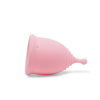For many women, the menstrual cycle is an unavoidable part of life. Alongside the physical and emotional changes that come with it, there's another aspect that often goes unnoticed: its impact on digestion. In this article, we'll delve into the intricate relationship between periods and digestion, exploring the various ways in which hormonal fluctuations during menstruation can influence digestive health.
Understanding the Menstrual Cycle: Before we dive into how periods affect digestion, let's briefly recap the menstrual cycle. It typically lasts around 28 days, although it can vary from person to person. The cycle consists of four main phases: menstruation, the follicular phase, ovulation, and the luteal phase. Each phase is characterized by distinct hormonal changes orchestrated by the body.
Menstruation and Digestive Changes: During menstruation, the body sheds the uterine lining, resulting in bleeding. Alongside this, hormonal fluctuations, particularly a drop in estrogen and progesterone, can lead to various digestive symptoms for some women. These may include:
- Bloating: Hormonal shifts can cause water retention and bloating, leading to discomfort in the abdominal area.
- Constipation or Diarrhea: Changes in hormone levels can affect bowel movements, resulting in constipation for some and diarrhea for others.
- Cramps: Menstrual cramps, caused by uterine contractions, can sometimes radiate to the gastrointestinal tract, exacerbating digestive discomfort.
Hormonal Influence on Digestive Health: Estrogen and progesterone, the primary hormones involved in the menstrual cycle, can directly impact digestive function. Estrogen, for instance, can influence gut motility, while progesterone has a relaxing effect on smooth muscles, including those in the digestive tract. These hormonal fluctuations can affect the pace at which food moves through the intestines, potentially leading to changes in bowel habits.
Tips for Managing Digestive Discomfort During Periods: While it's natural for digestive symptoms to occur during menstruation, there are several strategies to help alleviate discomfort:
- Stay Hydrated: Drinking plenty of water can help reduce bloating and ease constipation.
- Maintain a Balanced Diet: Consuming fiber-rich foods, fruits, and vegetables can support regular bowel movements and ease digestive discomfort.
- Gentle Exercise: Engaging in light physical activity, such as walking or yoga, can help alleviate bloating and improve overall well-being.
- Consider Supplements: Some women find relief from digestive symptoms by taking supplements such as magnesium or probiotics. However, it's essential to consult a healthcare provider before starting any new supplement regimen.




Leave a comment